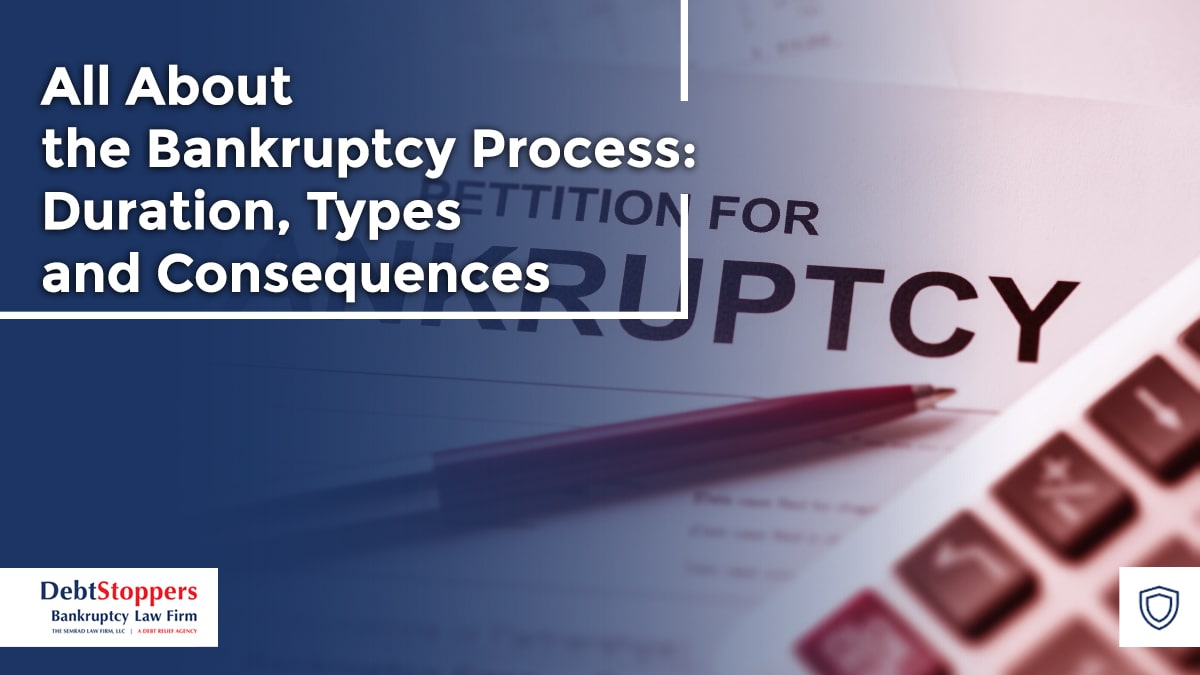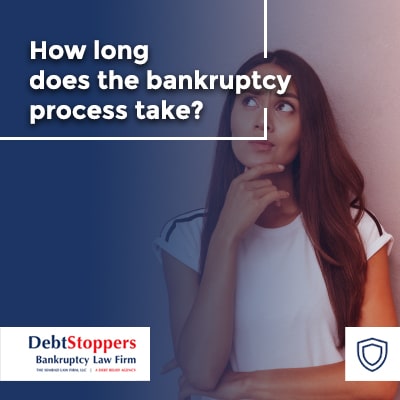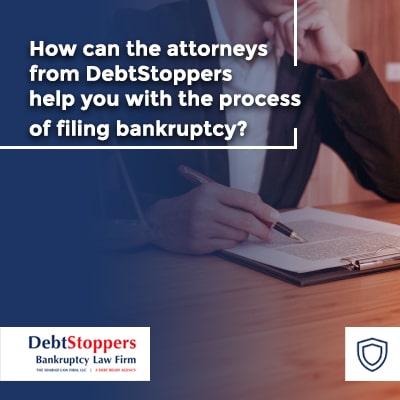All About The Bankruptcy Process: Duration, Types and Consequences

Bankruptcy can be complex and stressful. This guide will tell you everything you need to know about the bankruptcy process, duration, types, and consequences.
What is the bankruptcy process?
Bankruptcy is a legal proceeding designed to help individuals or businesses eliminate or repay their debts under the protection of the bankruptcy court. The process differs depending on the type of bankruptcy you file, such as Chapter 7, Chapter 13, or Chapter 11, but each follows a similar general process.
Before filing for bankruptcy, you must complete credit counseling from an approved agency. This is a mandatory requirement, and the certificate of completion will be filed with your bankruptcy petition.
Once you’ve decided which type of bankruptcy to file, you (or your attorney) will need to prepare and file the bankruptcy forms with the bankruptcy court to officially start the process. You will also need to pay a filing fee, which is typically more than $300.
After you file your bankruptcy petition, an automatic stay goes into effect immediately. This is a court order that stops creditors from taking collection actions against you, including wage garnishment, repossession, foreclosure, and lawsuits for unpaid debts.
Next, you’ll attend a meeting of creditors (341 Meeting), which is an opportunity for the trustee and creditors to ask you questions about your financial situation and bankruptcy petition including your assets, debts, income, and expenses.
Before you can receive a bankruptcy discharge, you are required to complete a course that is designed to help you understand how to manage your finances better in the future and is mandatory in both Chapter 7 and Chapter 13 cases. The certificate of completion must be filed with the court.
Next, depending on the type of bankruptcy you file, the trustee will distribute any non-exempt assets to creditors (if applicable) or approve your repayment plan. If you fail to keep up with your payment plan, your case could be dismissed or converted to Chapter 7, which would result in liquidation of some assets.

How long does the bankruptcy process take?
The length of the bankruptcy process depends on the type of bankruptcy filed.
Chapter 7 typically takes three to six months from filing to discharge. After you file, you must attend a meeting of creditors within about 30 to 45 days.
Chapter 13 typically lasts three to five years, depending on the length of your court-approved repayment plan. After filing, you must complete the repayment plan before the remaining eligible debt is discharged.
Other factors can affect the timing of your case including if creditors dispute the discharge of certain debt, issues with documentation, and changes in your financial situation that could require you to adjust your repayment plan.
How does bankruptcy work?
Bankruptcy provides a legal way to eliminate or manage overwhelming debts, which can offer you a fresh financial start. The specific process and outcome depend on the type of bankruptcy you file. The court, trustees, and creditors all play a role in the process, and it offers significant relief from debt.
What types of bankruptcy are there?
There are several types of bankruptcy, but the most common types of bankruptcy are Chapter 7, Chapter 11, and Chapter 13.
Chapter 7 bankruptcy
Chapter 7 bankruptcy is sometimes called liquidation bankruptcy and is designed to help individuals and businesses discharge or eliminate most of their unsecured debts. Chapter 7 bankruptcy is intended to give people a fresh financial start by wiping out debts such as credit card balances, medical bills, and personal loans. To qualify for Chapter 7, you must pass a means test to qualify, which compares your income to the median in your state.
Chapter 11 bankruptcy
Chapter 11 bankruptcy is typically used by businesses, but it can also be filed by individuals with high levels of debt. Unlike Chapter 7 or Chapter 13, which are often used by individuals, Chapter 11 allows businesses or individuals to restructure their debts while continuing operations or managing their financial affairs.
Chapter 13 bankruptcy
Chapter 13 bankruptcy is also known as reorganization bankruptcy, which allows people with regular income to create a repayment plan to pay off their debts. Chapter 13 lets people keep their property while catching up on overdue payments through a structured repayment plan.
Are there any consequences from filing for bankruptcy?
Yes, filing for bankruptcy comes with several consequences that can impact your financial life for years to come. While bankruptcy can provide relief from overwhelming debt, it is important to understand both the short-term and long-term consequences.
Some immediate consequences are a negative impact on your credit score, difficulty obtaining loans/credit, loss of property (Chapter 7), and an emotional toll. However, many people experience significant relief after filing for bankruptcy because they are no longer burdened by unmanageable debt or collection efforts.
Before receiving a discharge in bankruptcy, you are required to complete a debtor education course, which is designed to help you learn how to manage your finances better and avoid future debt problems.
If you receive a discharge through bankruptcy, there are limits on how soon you can file for bankruptcy again.

How can the attorneys from DebtStoppers help you with the process of filing bankruptcy?
The experienced attorneys at Debtstoppers can help you every step of the way. The bankruptcy attorneys at Debstoppers can help guide you through the complex legal process and ensure that you make informed decisions.
One of the first things a bankruptcy attorney will do is help you determine whether filing for bankruptcy is the best solution for your financial situation. Our attorneys will review your debts, assets, income and expenses to help you understand which type of bankruptcy is best for your situation.
Bankruptcy laws have very specific rules and procedures, and Debtstoppers will ensure that you meet all legal requirements. We will help you complete the mandatory credit counseling course required before filing for bankruptcy and submit proof of completion to the court and after filing, your attorney will assist in making sure you complete the debtor education course, which is required to receive a discharge of your debts.
Bankruptcy involves extensive paperwork, and even minor errors can lead to delays or dismissal of your case. An attorney will ensure that all forms and schedules are correctly completed and submitted.
Our attorneys will help ensure you have all the necessary documents, such as tax returns, pay stubs, and a list of assets and debts, to file your bankruptcy petition. We prepare and file schedules that list all of your financial information, including debts, assets, income, and expenses. Our experienced bankruptcy attorneys will help you avoid common mistakes, such as omitting important information, which could result in denial of your discharge or other penalties.
Furthermore, an experienced bankruptcy attorney will help protect your assets and explain exemptions.
Debtstoppers will represent you in court proceedings, ensuring that your interests are protected and that you meet all legal obligations. Your attorney will attend the 341 Meeting with you, where the bankruptcy trustee and creditors can ask you questions about your finances. The attorney will prepare you for this meeting and handle any objections that may arise.
After your debts are discharged, your attorney can provide tips on managing your finances, using secured credit, and improving your credit score. Bankruptcy can sometimes become more complex than expected, with disputes or challenges arising during the process.
Mistakes during the bankruptcy process can result in serious consequences, including dismissal of your case or denial of your discharge. Debtstoppers will ensure your case is properly handled to avoid these pitfalls. Your attorney will make sure all forms are filed on time, and all court rules are followed, so your case isn’t dismissed due to technical errors.
The experienced bankruptcy attorneys at Debtstoppers will ensure that the bankruptcy process goes smoothly and that your rights and interests are protected. From choosing the right type of bankruptcy and completing the paperwork to representing you in court and helping you protect your assets; our attorneys provide expert guidance and support every step of the way. Filing for bankruptcy can be complex and stressful but with an experienced attorney, you’ll have the best chance of achieving a successful outcome.





